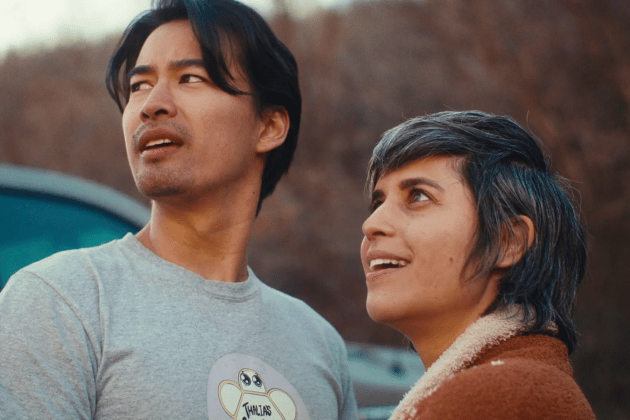‘We’re All Gonna Die’ Review: A Grief-Stricken Indie with Wasted Sci-Fi Potential
- Oops!Something went wrong.Please try again later.

A sci-fi road trip steeped unevenly in grief, “We’re All Gonna Die” introduces its concept in exciting fashion before pushing it far into the background. Its lead performances are occasionally powerful, but writer-directors Freddie Wong and Matthew Arnold — of web-based studio RocketJump — struggle to keep their subject matter sincere, resulting in tonal oddities.
An enormous alien “spike” crashes down on Earth and begins teleporting between locations, a premise the movie establishes deftly through news and social media clips. Twelve years and nearly 1500 “jumps” later — setting the movie somewhere in 2036, though technology has seemingly come to a standstill — mass death and casualty have run so rampant that they’ve become entirely commonplace.
More from Variety
As beekeeper Thalia (Ashly Burch) goes about her day, her parents and in-laws gather to mourn her departed husband and daughter, a loss she seems to ignore, letting the weeds around their tombstones run wild with neglect. As the giant stalactite hovers in the distance, she embarks on an important honey delivery by truck to pay off her mounting debts, a journey along which she (quite literally) runs into Kai (Jordan Rodrigues), an EMT grieving the recent loss of his best friend by sitting in his abandoned sports car. Before long, their combination collision/meet-cute is interrupted by a bizarre spike-related phenomenon that teleports Thalia’s bees and Kai’s recently inherited vehicle across state lines, forcing them to pair up for a retrieval mission that brings their respective personal tragedies into focus.
Unfortunately, issues with the film’s construction quickly rear their head. While silent moments between the characters offer hints of chemistry — sometimes in funny ways, like how Thalia hates that she’s turned on by Kai’s muscular calves — their conversations tend to sound repetitive, leading to lengthy scenes with little rhythm or resonance. This unpolished quality extends to the movie’s comedy too; apart from the occasional visual gag (à la Thalia having to suppress her calf-related desires), its jokes stem less from specific quirks and interpersonal dynamics, and more from observations and quips that feel interchangeable between the characters.
At first, the duo’s jabs work to create an uneasy romantic tension between them amid their disorienting predicament, but this tone of conversation is seldom modulated, even as the characters are forced to reflect on the differing ways they process death. It gets to a point where every minor character they come across — usually some wayward, sympathetic soul dealing with struggles of their own — becomes a target of their snark, yielding an irreverent meanness that seldom lets up.
All the while, the movie’s conceit gets pushed further into the backdrop until it nearly disappears, before re-emerging with physical properties (and more importantly, emotional symbolism) previously un-established. Ironically, this teleporting spike ends up a roving metaphor, too malleable and too removed to echo the characters in the foreground.
The spectacle of abstract sci-fi has enormous potential to reflect the complexities of grief (see Tarkovsky’s “Solaris” and “Stalker,” Alex Garland’s “Annihilation” and Darren Aronofsky’s “The Fountain”), but “We’re All Gonna Die” fashions its symbolism in a manner too scattered and vague to leave a lasting impact. It is, for all intents and purposes, a post-COVID movie that attempts to reckon with deaths and societal alterations on a massive scale. But despite loss being a common theme for every minor and major character, the movie never fully captures the vastness of these ripples in the social fabric, nor the intimacy of how they might change individuals to their core.
At the very least, Burch and Rodrigues do enough emotional heavy lifting to imbue the movie with a sense of recognizable humanity, against the dreamlike warmth of cinematographer Bongani Mlambo’s lush, magic-hour photography. The actors struggle, in accomplished and intentional ways, against the confusing enormity of loss. However, the filmmakers also struggle — less intentionally so — to meaningfully contextualize this experience. In the process, “We’re All Gonna Die” comes tragically close to being resonant.
Best of Variety
Sign up for Variety’s Newsletter. For the latest news, follow us on Facebook, Twitter, and Instagram.
